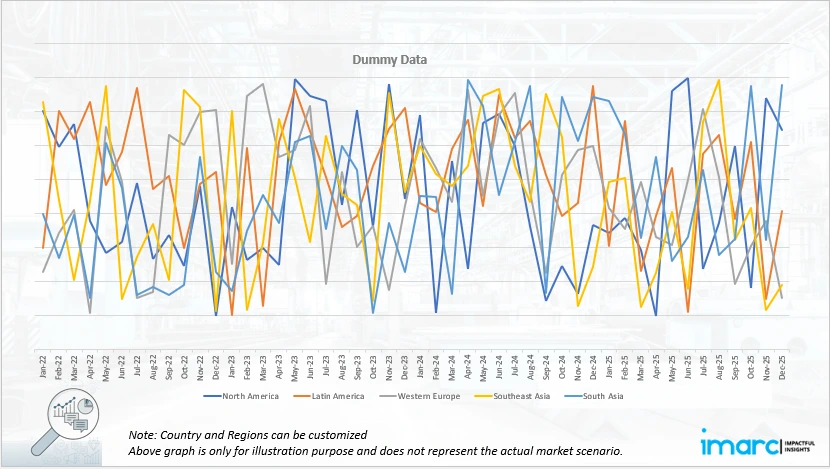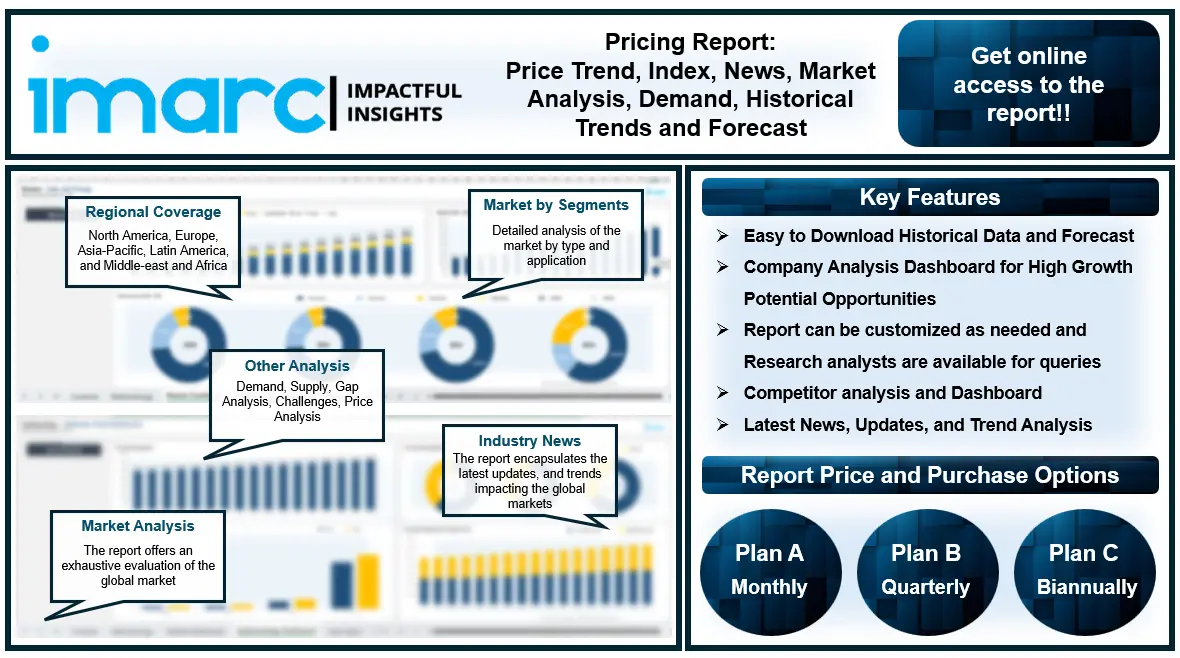
Cellulose Prices, Trend, Chart, Demand, Market Analysis, News, Historical and Forecast Data Report 2025 Edition
Cellulose Price Trend, Index and Forecast
Track the latest insights on cellulose price trend and forecast with detailed analysis of regional fluctuations and market dynamics across North America, Latin America, Central Europe, Western Europe, Eastern Europe, Middle East, North Africa, West Africa, Central and Southern Africa, Central Asia, Southeast Asia, South Asia, East Asia, and Oceania.
Cellulose Prices Outlook Q3 2025
- USA: USD 3910/Ton
- China: USD 4737/Ton
- Germany: USD 3284/Ton
- India: USD 2181/Ton
- Brazil: USD 4212/Ton
Cellulose Price Chart

Get real-time access to monthly/quarterly/yearly prices Request Sample
During the third quarter of 2025, the cellulose prices in the USA reached 3910 USD/Ton in September. Prices moved upward as consistent consumption from packaging, hygiene, and specialty chemical applications maintained strong procurement momentum. Temporary supply tightness emerged due to planned mill outages and extended transportation lead times. Higher production costs associated with energy and process chemicals further supported elevated price levels throughout the quarter.
During the third quarter of 2025, the cellulose prices in China reached 4737 USD/Ton in September. Values decreased as downstream textile and viscose manufacturers operated at moderated run rates, reducing raw material demand. Improving inventory positions at major producers and stable operational efficiency strengthened domestic availability. With export activity softening and logistics operating more predictably, buyers adopted a cautious purchasing approach, contributing to the overall downward price direction.
During the third quarter of 2025, the cellulose prices in Germany reached 3284 USD/Ton in September. Prices increased as stronger procurement from packaging and industrial material fabricators supported an uptick in overall consumption. Improved cost pass-through from suppliers and rising operational expenses added to upward movement. Even with adequate access to imported pulp, producers faced higher energy and compliance-related costs, which reinforced the positive adjustment in this quarter’s pricing structure.
During the third quarter of 2025, the cellulose prices in India reached 2181 USD/Ton in September. Domestic prices strengthened due to firm activity from pharmaceutical excipient, textile, and processed food manufacturers. Supply remained relatively tight as intermittent production slowdowns and extended delivery timelines affected availability. Upward revisions were further encouraged by inflationary input expenses, particularly in caustic soda, transport, and auxiliary processing materials.
During the third quarter of 2025, the cellulose prices in Brazil reached 4212 USD/Ton in September. Prices climbed as a higher portion of domestic pulp output was directed toward export contracts, limiting local supply. Weather-driven disruptions influenced harvesting, storage, and inland transport. Robust demand from packaging and industrial chemical users supported stronger price sentiment, contributing to elevated domestic quotations across the quarter.
Cellulose Prices Outlook Q2 2025
- USA: USD 3830/Ton
- China: USD 4845/Ton
- Germany: USD 3178/Ton
- India: USD 2088/Ton
- Brazil: USD 3945/Ton
During the second quarter of 2025, the cellulose prices in the USA reached 3830 USD/Ton in June. In Q2 2025, cellulose prices in the United States were influenced by reduced production rates at domestic pulp mills due to scheduled maintenance and labor shortages. The packaging and construction sectors maintained steady demand, while weather-related disruptions in timber harvesting regions constrained raw material availability. Additionally, elevated transportation costs and fuel surcharges affected the delivery timelines and pricing structures across multiple downstream applications.
During the second quarter of 2025, cellulose prices in China reached 4845 USD/Ton in June. Cellulose pricing in China during Q2 2025 was impacted by sustained demand from the pharmaceuticals, textiles, and food processing sectors. Production output was intermittently affected by energy consumption controls and stricter emissions compliance regulations. Import volumes of certain pulp grades decreased due to extended customs clearance procedures and foreign exchange volatility, prompting end-users to rely more heavily on domestic sources with limited capacity flexibility.
During the second quarter of 2025, the cellulose prices in Germany reached 3178 USD/Ton in June. In Germany, Q2 2025 cellulose pricing was shaped by strong consumption from the construction materials and packaging industries. The reliance on imported raw pulp from Scandinavian suppliers introduced cost variability amid port congestion and freight schedule inconsistencies. Furthermore, heightened environmental compliance costs at local manufacturing units contributed to higher conversion expenses, while strategic inventory adjustments were made in anticipation of regulatory updates on bio-based materials.
During the second quarter of 2025, the cellulose prices in India reached 2088 USD/Ton in June. India’s cellulose market in Q2 2025 experienced price fluctuations driven by robust demand from the textile and pharmaceutical sectors. Domestic production faced periodic disruptions due to water scarcity in key manufacturing regions, affecting pulp processing operations. Additionally, increased dependence on imports exposed buyers to shifting global freight rates and container shortages, while procurement delays prompted large-scale buyers to secure forward contracts at elevated premiums.
During the second quarter of 2025, the cellulose prices in Brazil reached 3945 USD/Ton in June. In Brazil, Q2 2025 cellulose prices were primarily influenced by variable weather conditions that disrupted timber harvesting in key forested areas, leading to irregular raw material availability. The packaging and hygiene product sectors sustained consistent demand, while several pulp producers faced operational inefficiencies due to maintenance schedules and logistical bottlenecks at major export terminals. Currency fluctuations and export commitments to Asian markets further shaped local pricing strategies.
Cellulose Prices Outlook Q1 2025
- USA: USD 3745/Ton
- China: USD 4970/Ton
- Germany: USD 3065/Ton
- India: USD 1985/Ton
- Brazil: USD 3670/Ton
Regional Coverage
The report provides a detailed analysis of the market across different regions, each with unique pricing dynamics influenced by localized market conditions, supply chain intricacies, and geopolitical factors. This includes price trends, price forecast and supply and demand trends for each region, along with spot prices by major ports. The report also provides coverage of FOB and CIF prices, as well as the key factors influencing the cellulose prices.
Europe Cellulose Price Trend
Q3 2025:
As per the cellulose price index, Europe experienced a moderately firmer pricing environment, consistent with the upward movement reported in Germany during this quarter. Stronger procurement from the packaging, hygiene, and industrial materials sectors supported a slight strengthening in market sentiment. Enhanced supply from Scandinavian and Baltic mills maintained regional availability, while elevated energy and compliance-related operating expenses encouraged suppliers to adjust quotations. Stable import flows further improved distribution, although transport and regulatory costs continued to shape pricing across several key submarkets.
Q2 2025:
Cellulose pricing in Europe was impacted by steady demand from the packaging, construction, and specialty chemicals sectors. Supply chains were strained by port congestion and longer transit times for pulp imports from North and South America. Regional producers faced rising energy and labor costs, while environmental regulations pushed operational costs higher. Uncertainty surrounding the European Union’s sustainability directives prompted inventory repositioning by major buyers, contributing to increased procurement volatility.
This analysis can be extended to include detailed cellulose price information for a comprehensive list of countries.
| Region | Countries Covered |
|---|---|
| Europe | Germany, France, United Kingdom, Italy, Spain, Russia, Turkey, Netherlands, Poland, Sweden, Belgium, Austria, Ireland, Switzerland, Norway, Denmark, Romania, Finland, Czech Republic, Portugal, and Greece, among other European countries. |
North America Cellulose Price Trend
Q3 2025:
As per the cellulose price index, North American prices increased as export activity toward Asia tightened domestic supply. Planned maintenance schedules at several mills constrained output and lengthened delivery timelines. Transport bottlenecks across rail and trucking networks added pressure on regional inventories by slowing inland movement. Higher fuel, labor, and processing additive costs reinforced upward supplier revisions and contributed to a stronger pricing environment across key industrial and packaging markets.
Q2 2025:
In North America, cellulose prices in Q2 2025 were influenced by a combination of constrained pulp production capacity and elevated transportation expenses. Several mills underwent maintenance shutdowns, limiting domestic output. The construction and hygiene product sectors continued to drive demand. Logistical challenges, including fuel cost volatility and labor shortages in freight services, added pressure across the supply chain. Cross-border trade activity also encountered administrative delays, affecting material flow consistency.
Specific cellulose historical data within the United States and Canada can also be provided.
| Region | Countries Covered |
|---|---|
| North America | United States and Canada |
Middle East and Africa Cellulose Price Trend
Q3 2025:
As per cellulose price chart, the prices in the Middle East and Africa fluctuated due to a complex interplay of factors, primarily driven by supply chain disruptions, seasonal demand shifts, and geopolitical influences.
Q2 2025:
The report explores the cellulose pricing trends and cellulose price chart in the Middle East and Africa, considering factors like regional industrial growth, the availability of natural resources, and geopolitical tensions that uniquely influence market prices.
In addition to region-wise data, information on cellulose prices for countries can also be provided.
| Region | Countries Covered |
|---|---|
| Middle East & Africa | Saudi Arabia, UAE, Israel, Iran, South Africa, Nigeria, Oman, Kuwait, Qatar, Iraq, Egypt, Algeria, and Morocco, among other Middle Eastern and African countries. |
Asia Pacific Cellulose Price Trend
Q3 2025:
Asia Pacific pricing displayed varied movements across major markets, shaped by distinct consumption trends and supply patterns. India and several Southeast Asian economies saw firmer sentiment due to active demand from pharmaceuticals, packaged foods, and textiles, in contrast with weaker market conditions in China where inventories remained high. Maintenance activities at regional mills and periodic maritime delays affected short-term availability. Currency fluctuations influenced delivered costs for import-reliant economies, contributing to diverse pricing outcomes across the region.
Q2 2025:
Asia Pacific’s cellulose market in Q2 2025 saw pricing shaped by divergent regional dynamics. China and India recorded strong demand from the textile, pharmaceutical, and food sectors, while domestic supply was periodically disrupted by energy restrictions and compliance-related production slowdowns. Import-dependent markets such as South Korea and Japan faced delayed shipments and rising freight costs. Forward buying increased across advanced manufacturing hubs, driven by concerns over raw material availability and pricing instability.
This cellulose price analysis can be expanded to include a comprehensive list of countries within the region.
| Region | Countries Covered |
|---|---|
| Asia Pacific | China, India, Indonesia, Pakistan, Bangladesh, Japan, Philippines, Vietnam, Thailand, South Korea, Malaysia, Nepal, Taiwan, Sri Lanka, Hongkong, Singapore, Australia, and New Zealand, among other Asian countries. |
Latin America Cellulose Price Trend
Q3 2025:
Latin American cellulose prices advanced as production constraints in major supply zones and elevated dependency on imported pulp tightened availability. Currency depreciation in several economies heightened the cost of foreign-sourced raw materials. Consistent demand from the packaging, hygiene, and industrial processing sectors added upward support. Inland transportation delays and port-handling inefficiencies contributed to higher overall distribution expenses, reinforcing a firmer pricing environment across the region.
Q2 2025:
In Latin America, especially Brazil, Q2 2025 cellulose pricing was driven by both domestic and external factors. Weather-induced harvesting delays affected raw material input availability for pulp manufacturers. The packaging and tissue paper sectors maintained firm demand, while several producers prioritized exports to Asia, tightening regional supply. Operational inefficiencies at export terminals and fuel price inflation further complicated cost structures. Currency fluctuations also played a role in shaping local procurement and pricing strategies.
This comprehensive review can be extended to include specific countries within the region.
| Region | Countries Covered |
|---|---|
| Latin America | Brazil, Mexico, Argentina, Columbia, Chile, Ecuador, and Peru, among other Latin American countries. |
Cellulose Pricing Report, Market Analysis, and News
IMARC's latest publication, “Cellulose Prices, Trend, Chart, Demand, Market Analysis, News, Historical and Forecast Data Report 2025 Edition,” presents a detailed examination of the cellulose market, providing insights into both global and regional trends that are shaping prices. This report delves into the spot price of cellulose at major ports and analyzes the composition of prices, including FOB and CIF terms. It also presents detailed cellulose prices trend analysis by region, covering North America, Europe, Asia Pacific, Latin America, and Middle East and Africa. The factors affecting cellulose pricing, such as the dynamics of supply and demand, geopolitical influences, and sector-specific developments, are thoroughly explored. This comprehensive report helps stakeholders stay informed with the latest market news, regulatory updates, and technological progress, facilitating informed strategic decision-making and forecasting.

Cellulose Industry Analysis
The global cellulose industry size reached USD 2.04 Billion in 2025. By 2034, IMARC Group expects the market to reach USD 2.95 Billion, at a projected CAGR of 4.18% during 2026-2034. The market is expanding due to rising consumption in packaging, pharmaceuticals, textiles, and food-processing applications, supported by increasing industry preference for biodegradable, renewable, and high-performance materials across global manufacturing chains.
Latest News and Developments:
- May 2025: HKRITA and Seiko Epson Corporation developed a new regenerated cellulose fiber with a “silk-like” sheen produced by transforming discarded cotton fabric into regenerated cellulose via a novel production process combining Epson’s Dry Fiber Technology and HKRITA’s fiber-dissolving technique. The new regenerated fiber reportedly offers the smoothness and aesthetic qualities of silk while retaining the strength of cotton, and could be used in high-end materials such as scarves, neckties, and suit linings.
Product Description
Cellulose, a polysaccharide found in plant cell walls, is a crucial organic compound with remarkable properties such as strength, rigidity, and insolubility in water. It forms the primary component of plant cell walls, providing structural support and enabling plants to stand upright and withstand environmental stresses. Cellulose also serves as a dietary fiber for humans, promoting digestive health by adding bulk to stool and facilitating its passage through the digestive tract. Its low-calorie content makes cellulose-rich foods beneficial for weight management and overall health.
Cellulose's unique properties make it an essential product in the paper and textiles sector, as well as in various industries like pharmaceuticals, food, and cosmetics. Its derivatives, such as cellulose acetate and carboxymethyl cellulose, are used in various industries for their film-forming, thickening, and stabilizing properties.
Report Coverage
| Key Attributes | Details |
|---|---|
| Product Name | Cellulose |
| Report Features | Exploration of Historical Trends and Market Outlook, Industry Demand, Industry Supply, Gap Analysis, Challenges, Cellulose Price Analysis, and Segment-Wise Assessment. |
| Currency/Units | US$ (Data can also be provided in local currency) or Metric Tons |
| Region/Countries Covered | The current coverage includes analysis at the global and regional levels only. Based on your requirements, we can also customize the report and provide specific information for the following countries: Asia Pacific: China, India, Indonesia, Pakistan, Bangladesh, Japan, Philippines, Vietnam, Thailand, South Korea, Malaysia, Nepal, Taiwan, Sri Lanka, Hongkong, Singapore, Australia, and New Zealand* Europe: Germany, France, United Kingdom, Italy, Spain, Russia, Turkey, Netherlands, Poland, Sweden, Belgium, Austria, Ireland, Switzerland, Norway, Denmark, Romania, Finland, Czech Republic, Portugal and Greece* North America: United States and Canada Latin America: Brazil, Mexico, Argentina, Columbia, Chile, Ecuador, and Peru* Middle East & Africa: Saudi Arabia, UAE, Israel, Iran, South Africa, Nigeria, Oman, Kuwait, Qatar, Iraq, Egypt, Algeria, and Morocco* *The list of countries presented is not exhaustive. Information on additional countries can be provided if required by the client. |
| Information Covered for Key Suppliers |
|
| Customization Scope | The report can be customized as per the requirements of the customer |
| Report Price and Purchase Option |
Plan A: Monthly Updates - Annual Subscription
Plan B: Quarterly Updates - Annual Subscription
Plan C: Biannually Updates - Annual Subscription
|
| Post-Sale Analyst Support | 360-degree analyst support after report delivery |
| Delivery Format | PDF and Excel through email (We can also provide the editable version of the report in PPT/Word format on special request) |
Key Benefits for Stakeholders:
- IMARC’s report presents a detailed analysis of cellulose pricing, covering global and regional trends, spot prices at key ports, and a breakdown of FOB and CIF prices.
- The study examines factors affecting cellulose price trend, including input costs, supply-demand shifts, and geopolitical impacts, offering insights for informed decision-making.
- The competitive landscape review equips stakeholders with crucial insights into the latest market news, regulatory changes, and technological advancements, ensuring a well-rounded, strategic overview for forecasting and planning.
- IMARC offers various subscription options, including monthly, quarterly, and biannual updates, allowing clients to stay informed with the latest market trends, ongoing developments, and comprehensive market insights. The cellulose price charts ensure our clients remain at the forefront of the industry.
Need more help?
- Speak to our experienced analysts for insights on the current market scenarios.
- Include additional segments and countries to customize the report as per your requirement.
- Gain an unparalleled competitive advantage in your domain by understanding how to utilize the report and positively impacting your operations and revenue.
- For further assistance, please connect with our analysts.
Why Choose Us
IMARC offers trustworthy, data-centric insights into commodity pricing and evolving market trends, enabling businesses to make well-informed decisions in areas such as procurement, strategic planning, and investments. With in-depth knowledge spanning more than 1000 commodities and a vast global presence in over 150 countries, we provide tailored, actionable intelligence designed to meet the specific needs of diverse industries and markets.
1000
+Commodities
150
+Countries Covered
3000
+Clients
20
+Industry
Robust Methodologies & Extensive Resources
IMARC delivers precise commodity pricing insights using proven methodologies and a wealth of data to support strategic decision-making.
Subscription-Based Databases
Our extensive databases provide detailed commodity pricing, import-export trade statistics, and shipment-level tracking for comprehensive market analysis.
Primary Research-Driven Insights
Through direct supplier surveys and expert interviews, we gather real-time market data to enhance pricing accuracy and trend forecasting.
Extensive Secondary Research
We analyze industry reports, trade publications, and market studies to offer tailored intelligence and actionable commodity market insights.
Trusted by 3000+ industry leaders worldwide to drive data-backed decisions. From global manufacturers to government agencies, our clients rely on us for accurate pricing, deep market intelligence, and forward-looking insights.
 Request Customization
Request Customization
 Inquire Before Buying
Inquire Before Buying
 Speak to an Analyst
Speak to an Analyst Request Brochure
Request Brochure




.webp)




.webp)












